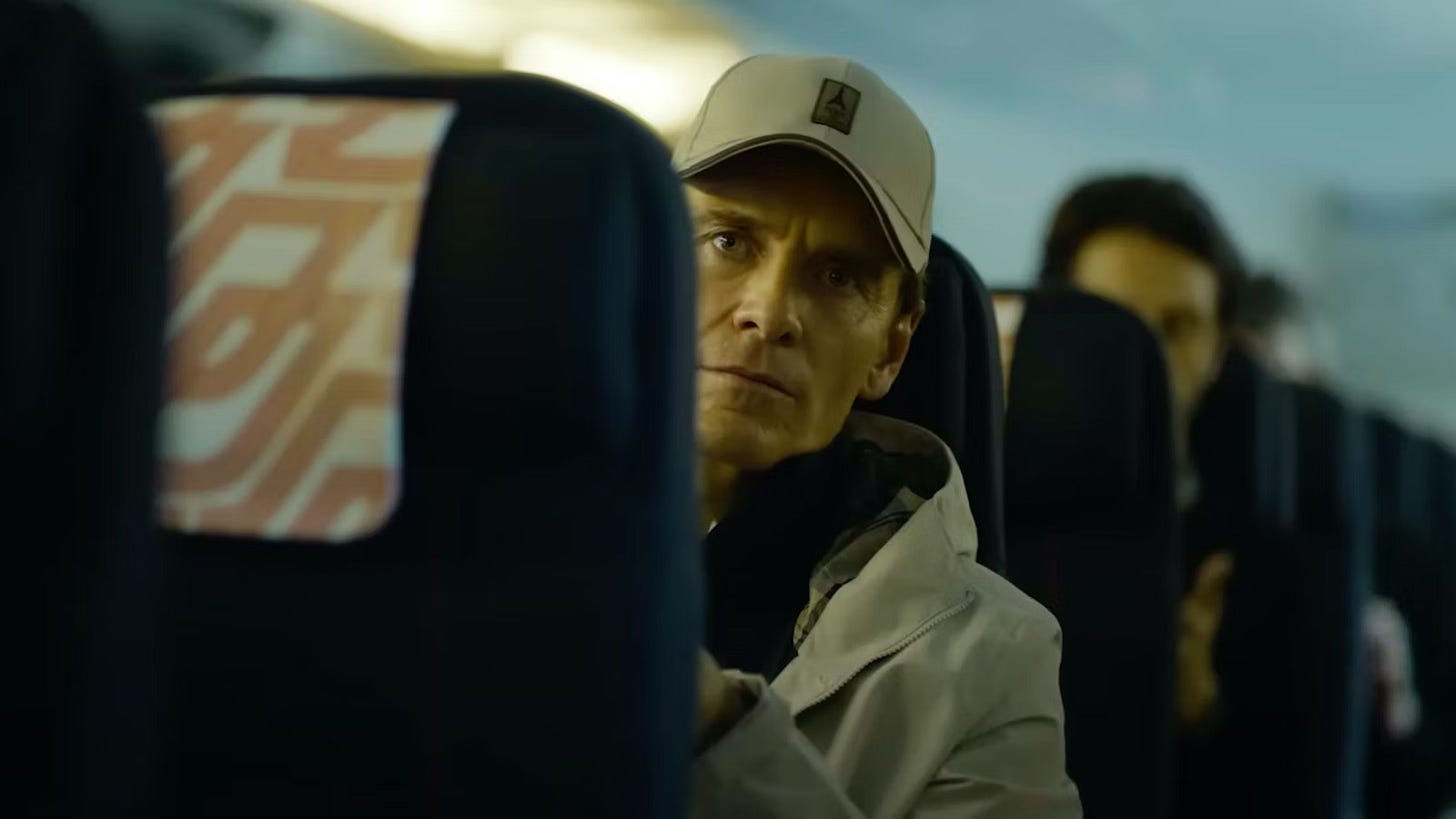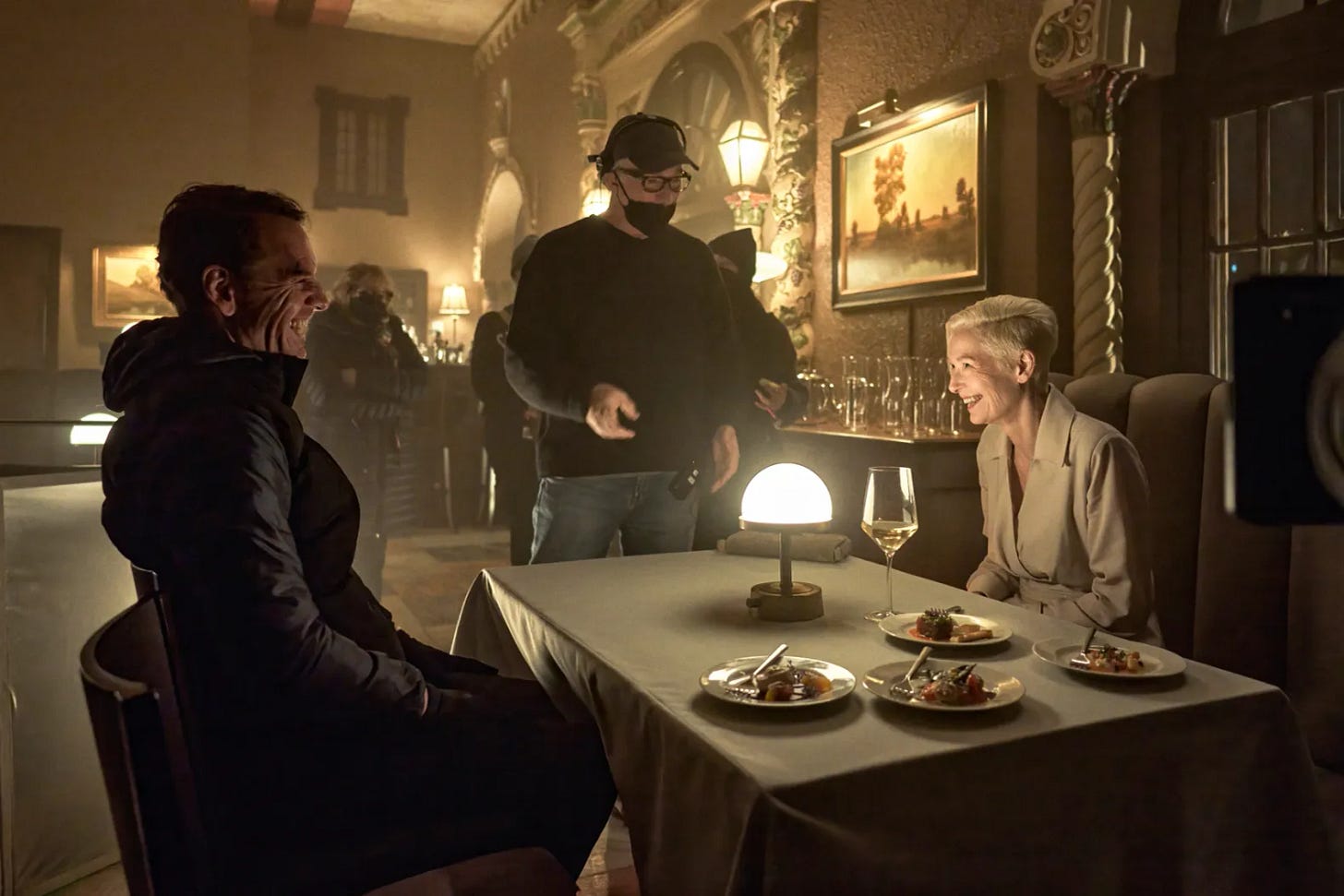The Killer slays you with its art, beauty, and dazzling technique.
It's the most perfectly realized film of 2023.
With an exquisitely controlled performance by Michael Fassbender (Inglorious Basterds, Steve Jobs), a haunting original score by Trent Reznor and Atticus Ross that captures the creepy warring jungle inside the protagonist’s subconscious, and stunningly meticulous direction by David Fincher (Fight Club, The Social Network) that matches, frame by frame, the precision, depth, and artistry of its subject, The Killer is the most fully realized film of 2023. In terms of cerebral assassin flicks, it’s up there with Day of the Jackal (starring Edward Fox), the previous gold standard of perfectionist wet work.
No surprise that the Golden Globes snubbed this mini-masterpiece. Most film journalists don’t grasp what Fincher is getting at here, with his subtle bunnies of irony and meaning that reward repeat viewing. The acclaimed auteur is showing, as his killer often opines, “what it takes if you want to succeed” in any profession, from movie-making to murder-for-hire.
Towards that end, The Killer dispenses early on with the childish search for purpose in a world where humans display an astounding, almost instinctual, capacity for evil: “Of those who like to put their faith in the inherent goodness of mankind, I have to ask, ‘Based on what, exactly?’" Why would someone pay to have someone else killed, the everyman asks? Aren't there cleaner ways to resolve a conflict? The Killer doesn’t care. There is no enduring purpose, the stars are indifferent to our designs, this 21st-century Misfit calmly intones. Fate, karma, and justice are MacGuffins to string us along. But there is art, which is its reward, manifestly found in a job well done.
Dispatching with the why allows Fincher to concentrate on the YouTube Millennial question of how, and the Herculean lengths to which a professional must go to be the best. In a long string of measured monologues, The Killer says in so many words, “Let me show you.”
First, have a practice that keeps you focused on the job at hand. For The Killer, that includes yogic salutations to the sun, a soundtrack by The Smiths, a gluten-free diet, and conscious breathing. Second, stay in your lane. The Killer is not paid to ask why. He is paid to perform a highly specific task, as gruesome as that may be. Third, build in redundancies upon redundancies.
This killer is au courant––an uber-realistic, uber-punctilious life coach, a Marie Kondo of murder, not preaching cheesy New Age pablum, but empirically tested wisdom about process, mindset, and excellence: “Stick to your plan.” “Anticipate, don’t improvise.” “Trust no one.” “Never yield an advantage.” “Fight only the battle you're paid to fight.“ “Each and every step of the way ask yourself, 'What's in it for me?’” And when things go awry, ponder “WWJWBD: What Would John Wilkes Both Do?”
For this killer, the decision about whether to kill a person has nothing to do with right and wrong, but whether it’s worth the trouble that will invariably redound to you. If you carefully watch The Killer work, you will learn where you get sloppy in your life and career, how you get sucked into detours, and why you are not at the pinnacle of your profession.
But there’s more here than What Color is Your Parachute for Sociopaths. The Killer navigates today’s intrusive surveillance state by being conspicuously inconspicuous (he prefers innocuous German tourist camo “because no one wants to interact with a German tourist”), by staying in abandoned WeWork offices (Airbnbs are now démodé—”super hosts love their nanny cams”), and by deploying fake IDs based on legendary TV show characters (Felix Unger, Oscar Madison, Archibald Bunker) that almost no one under 40 has heard of or can track as fraudulent.
In the 21st-century’s clean, detached, high-tech world, the glitches are all too human. Police are overworked, cases pile up, and so billionaires––not ordinary schmo’s––get their attention. The gatekeepers one encounters are not very precise or observant––with antiquated security, gullible dispositions, life-threatening lifestyles, short attention spans, and a bundle of excuses––so you can work them to your advantage. You can order everything you need from Amazon. You have to be willing to disappear. And you must endure tremendous boredom that tests your patience and willpower. It’s a spiritual practice, the assassin’s creed.
We are all killers of one kind or another posits the famously fastidious Fincher through his contract milling machine. It’s the director’s most self-referential work to date.
World-historical artists recognize and call to each other across the great divide, as Nietzsche made clear in his important, still-relevant essay, On the Use and Abuse of History for Life. The Killer has read his Nietzsche and his Dylan Thomas. His mid-career enlightenment is that no one’s going to protect you. And everyone you trust will eventually betray you. “It's a dog-eat-dog world, to reuse the apt cliché,” he quips. You make your meaning by doing your job––towards the modest goal of carving out a modicum of peace and pleasure within the void but outside the maddening crowd. What seems like nihilism is actually a dispassionate, aesthetic, eminently practical Zen, as taught by a thoroughly captivating outlaw.
Though the killer sticks to his credo––”the less you know the better”––he secretly hopes that his bosses are worthy of his crafty enlightenment. That they are not is The Killer’s big reveal. In a section entitled “The Client,” The Killer meets his ultimate paymaster, and is singularly unimpressed. In a slap at the squirrely hyperactive scoundrels at the heart of blockchain hype, the vaunted Client turns out to be an annoying crypto-schmuck who cuts corners on his security detail and general firewall of protection. Hoping to meet his match in finesse and acumen, The Killer instead finds a pathetically frightened wannabe not even worth being killed. “I'm curious. I break into your home in the middle of the night, with a silenced pistol, and you have no idea why I might be here?” asks the postmodern samurai. Though atheistic to the core, the suddenly moral killer wants to rid the world of this soulless scumbag. But, as a man “apart,” he is eminently aware of the limited resources at his disposal––why entice armies of corruptible law enforcement against himself simply because he offed some rich artless twerp.
In the so-called “Expert,” his female counterpart––the perfectly cast “cue tip,” Tilda Swinton––sent to kill him by his handler for missing the mark on a recent job in Paris, he too finds a depressing lack of vigilance and self-awareness. Upon being cornered in a posh restaurant, out with “the normies” in suburban Beacon, New York, “The Expert” delivers a glib loquacious monologue on all that is at stake, while revealing a sloppiness that’s an insult to their shared calling. In The Killer’s refined worldview, The Expert deserves to die not only because she’s another obstacle—albeit a witty one—but because of her imprecision in hiring a creatine-enhanced hulk to brutalize the one person The Killer holds dear, his Dominican girlfriend.
At the film’s end, the jungle is right outside The Killer’s pool. PAY ATTENTION, he silently says, his slight nervous twitch an emblem of the price one must pay to keep the jungle at bay. The problem in life is not difficulties, but how one responds to them. The Killer responds with humor, intelligence, and stunning aplomb. See it over and again until you fully grasp “what it takes, what you must commit yourself to, if you want to succeed.”








Excellent review I found myself laughing out loud a couple of times.
My favorite:
WWJWBD?